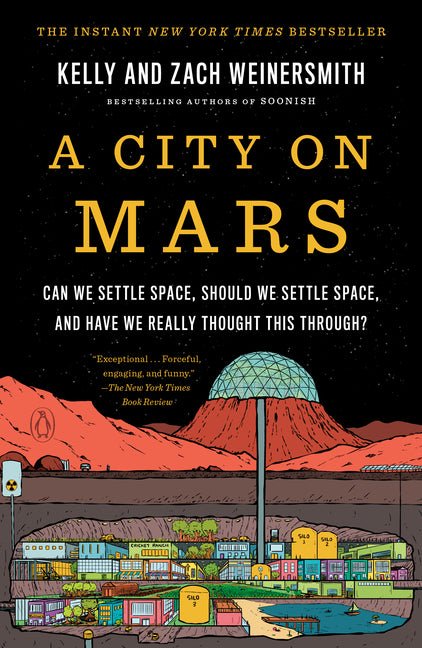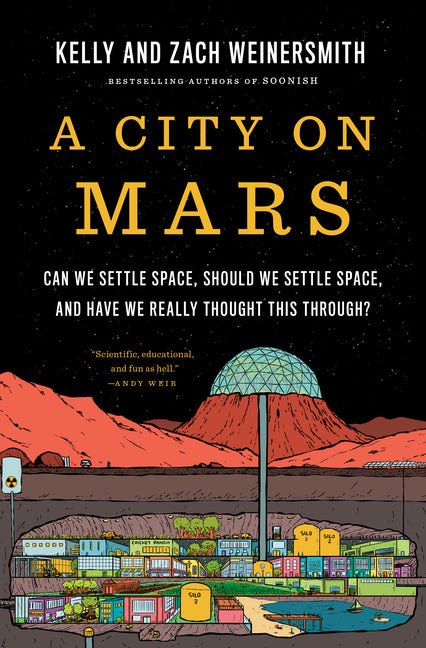A City on Mars: Can We Settle Space, Should We Settle Space, and Have We Really Thought This Through?
by Kelly Weinersmith, Zach Weinersmith
*When you open this audiobook on Libro.fm, be sure to select Aveson as your bookstore so that your purchase supports local literacy programs and tree‑planting.
Couldn't load pickup availability
* THE INSTANT NEW YORK TIMES BESTSELLER * Winner of the Hugo Award * Scientific American's #1 Book for 2023 * Winner of Royal Society's Trivedi Prize * A Guardian Best Book of 2024 * A New York Times Book Review Editors' Choice * A Times Best Science and Environment Book of 2023 * A Tor.com Best Book of 2023 *
"Exceptional. . . Forceful, engaging and funny . . . This book will make you happy to live on this planet -- a good thing, because you're not leaving anytime soon." --New York Times Book Review
From the bestselling authors of Soonish, a brilliant and hilarious off-world investigation into space settlement
EARTH IS NOT WELL. The promise of starting life anew somewhere far, far away--no climate change, no war, no doomscrolling--beckons, and settling the stars ï¬nally seems within our grasp. Or is it? Critically acclaimed, bestselling authors Kelly and Zach Weinersmith set out to write the essential guide to a glorious future of space settlements, but after years of research, they aren't so sure it's a good idea. Space technologies and space businesses are progressing fast, but we lack the knowledge needed to have space kids, build space farms, and create space nations in a way that doesn't spark conflict back home. In a world hurtling toward human expansion into space, A City on Mars investigates whether the dream of new worlds won't create nightmares, both for settlers and the people they leave behind. In the process, the Weinersmiths answer every question about space you've ever wondered about, and many you've never considered:
Can you make babies in space? Should corporations govern space settlements? What about space war? Are we headed for a housing crisis on the Moon's Peaks of Eternal Light--and what happens if you're left in the Craters of Eternal Darkness? Why do astronauts love taco sauce? Speaking of meals, what's the legal status of space cannibalism?
With deep expertise, a winning sense of humor, and art from the beloved creator of Saturday Morning Breakfast Cereal, the Weinersmiths investigate per-haps the biggest questions humanity will ever ask itself--whether and how to become multiplanetary.
Get in, we're going to Mars.
Share
Book Details
ISBN:
9781984881724
EAN:
9781984881724
Binding:
Hardcover
Pages:
448
Authors:
Kelly Weinersmith , Zach Weinersmith
Publisher:
Penguin Press


Dr. Kelly Weinersmith (born Smith; biologist, science enthusiast) and Zack Weinersmith (born Weiner; cartoonist, science enthusiast) have written two excellent books: SOONISH and this book, which continues their thorough consideration about what the future might bring.The writers describe how even a devastated Earth would be more hospitable than orbital habitats, the Moon, or Mars. The first is extremely vulnerable to unhealthy amounts of radiation; the second and third are covered in dangerous material (highly abrasive silica dust on the Moon, perchlorates in Martian soil). Legal issues are very unclear. (Chapter 12 is titled "The Outer Space Treaty: Great for Regulating Space Sixty Years Ago.")Low gravity is a constant concern throughout the book. Our experience with microgravity raises concerns. Could Martian settlers have grandkids? Consider potential mothers born and raised in low gravity; would they develop strong enough bones and muscles to safely give birth? There is literally no data.They don't call for giving up on space. We should expand the list of things humans can do well in space, and do those things. (That list gets shorter as robots become more capable.) We should investigate the long-term effects of living in low gravity. We should still learn how humans in space could live with cosmic ray exposure. We should still visit Mars.The Weinersmiths aren't pessimistic about long term habitation in space. They only worry about doing so in the near future, a couple decades or less. They argue it would take several decades or longer to truly understand the risks and the opportunities. Until then, Mars really ain't the kind of place to raise your kids, and "cold as hell" doesn't begin to cover it.To quote from a negative review here on Amazon: "the book is well written, it’s humorous, and they’re probably right about everything.... This book, while undoubtedly correct, is just sad and depressing."Much as I'd like to, I can't argue with the Weinersmiths' conclusion.For an alternative take, read the ninety page (!) essay, "Critique of 'A City on Mars' and Other Writings Opposing Space Settlement" by Dale S. Skran, senior VP and COO of the National Space Society (and a friend of mine).
I've been a scifi nerd since I was a kid and fell in love with Star Trek and my dad's Heinlein collection of novels. As someone who's been taken with space travel and settlements ever since I was very eager to read this book.As I read it though I could see why the Weinersmiths were reaching the conclusions they had come to and despite my wanting them to be wrong I have to agree with many of their points.The book itself manages to tell do all this with entertaining and well written prose with a fun sense of humor and is a book I'd very much recommend.
The first 40% of this book is excellent. It will convince you that sustainable colonies on Mars (or even the moon) are, technically, almost impossible, at least for centuries. But then the book tends to trudge through issues like space law and, while of interest, are really quite drawn out. Still, an excellent read, at least those first 40%.
This book is a TO DO list of things we earthlings need to figure out, slowly, and carefully, before we start dreaming of planting our flag with a smiley face emoji on Mars. It's stuff you don't hear or read about when experts say humans will be able to conquer Mars within the next 10 years. This book is a a MUST READ. The book is an easy to read book that doesn't burden you with high science and physics. Reading this book feels like you are having a a very casual chat with the authors- it's like you meet up with the authors and somehow you find yourself talking about the movie The Martian and then it slowly goes into a conversation of why Mars isn't going to happen in the near future. Anybody who says we'll be living in some new human settlement 140 million miles from earth, encased in a glass dome right in the middle of the red planet in a few years, needs to take a little step back and read this book. Hey, it's ok to dream big, as the book says, but dream with a sense of responsibility, understanding, knowledge, and some heavy doses of real science, reality checks, before taking on Mars.Mars is an inhospitable planet. Mars doesn't like anything that has life in it. It sucks life out of any life. Mars is such a bad rock to live in, it killed off anything that may have lived there millions of years ago, and it'll stay that way. Some billionaire guy said he'll build some atmosphere converter and terraform the planet; he's seen to much of the Aliens franchise. On a normal day you get 60mph winds, not bad, but then you get temperatures that drop to -110F, and then there's dust. No such thing as a dust-proof device. Then you have the constant bombardment of radiation. You're basically surrounded by life destroying elements. If it's not the radiation, it's all the dust that's going to finish humans off. Forget about propulsion, and big rockets, and bespoke space suits...the biggest question is will a human even survive the trip. Space gravity means bones get brittle, internal organ damage sets in, radiation exposure- these are things that will totally ruin someone's day.Hope and pray that thingy that provides oxygen to your glass dome world doesn't breakdown because it's going to be a long wait for the next resupply to Mars. Again, science fiction doesn't tell you travelling to Mars isn't as easy as plotting a course and launching a booster rocket; there's a specific window you need to wait for, some kind of orbit positioning, in order to launch and land on that rock. Launch outside of that window and you'll miss dear old Mars.Oh but wait there's more...the book delves into the one challenge that everyone forgets. Space laws and treaties. Yeah, my first time to read about it. Governments have enacted their own brand of galactic laws. You can't just build a space platform out in space. Authorities down on earth have created invisible lines in space. Imagine that, the arrogance of man even reaching out into space. Sorry Darth, your intended galactic conquest won't cut it as soon as you enter our solar system; you might want to roll up your window when you fly by earth because things get really dirty here on planet earth. This book will show how how difficult it is, and even how silly to even think about going to Mars, but the book does give hope- but only if we earthlings study the challenges and find smart solutions and not rely on Star Trek or Star Wars or... Aliens franchise technology to find a solution. There's a difference between science fiction and science. Our billionaires talk about science fiction and ignore the science. HIGHLY RECOMMENDED BOOK!
I finished the book, and my impression is the Moon is covered more than Mars. The problems are similar: cold, no breathable air, radiation, dangerous dust, low gravity damages human bodies. Except for being closer to Earth, the Moon is generally worse than Mars.I didn't discover any threats I'd never heard of, but the authors challenge the hand-waving optimism that the technologies to solve these issues is in-hand, or even close to being in-hand. They also challenge the usually-vaguely stated reasons to build settlements, and I don't think they create strawman arguments. (Ex: Humans have an urge to explore? Then, what % of folk risked their lives trekking to the south pole? or Mt Everest? Aren't most of us happy to be couch potatoes?)What I learned the most about was the legal framework and potential social/national conflicts that are likely to arise around space. Nerds may prefer to dream about massive rockets and cutting-edge technologies, but as long as humans are involved, the possibility that space exploits might start a war (cold or hot) on Earth is worth worrying about. Just not as much fun. Technical problems will eventually be solved. How do you solve people?The authors' conclusion that we're better off delaying until we can "go big" on settlements means I'll never see a Martian settlement in my lifetime. Bummer. Because the best reason to live in space (as the authors say) is because it would be awesome. I guess I'll rely on science fiction for my Mars settlement fix.



